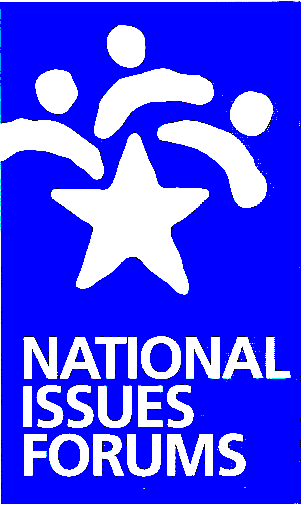| Links:
Gerald
R. Ford Museum
Grand Rapids Public
Library
Kettering Foundation
National Issues
Forums Institute
Study Circles
Resource Center
Contact:
grcommunityvoice@hotmail.com
|
What
is NIF?
National Issues Forums (NIF) is a nonpartisan, nationwide
network of locally sponsored forums for the consideration of public
policy issues. They are rooted in the simple notion that people
need to come together to reason and talk - to deliberate about
common problems. Indeed, democracy requires an ongoing deliberative
dialogue.
How
Does It Work?
Each year, major issues of concern are identifies by the
NIF network. Issue books, which provide an overview of the subject
and present several approaches, are prepared to frame the choice
work.
Forums are sponsored by thousands of organizations and institutions
within many communities. They offer citizens the opportunity to
join together to deliberate, to make choices with others about
ways to approach difficult issues, and to work toward creating
public judgment.
What
Is Public Deliberation?
Public deliberation is simply people coming together to
talk about a community problem that is important to them. Participants
deliberate with one another -- eye-to-eye, face-to-face, exploring
options, weighing other' views, considering the costs and consequences
of public policy decisions.
Citizens have an undelegable responsibility to make choices about
how to solve problems because the government alone cannot solve
them all. Citizens' views often differ from officeholders' views.
Deliberation may reveal new possibilities for action that neither
citizens nor officeholders saw before.
Forums enrich participants' thinking on public issues. The process
helps people -- who use choice work in their discovery -- to see
issues from different points of view. At their best, forums help
participants move toward shared, stable, well-informed public
judgments, based on what is valuable to them about important issues.
Through deliberation, participants move from making individual
choices to finding common ground for action.
Who
Participates?
A wide variety of organizations and institutions provide
public space for citizens to develop skills in convening and moderating
National Issues Forums. In many states, institutions of higher
education, humanities councils, and/or other civic organizations
have established Public Policy Institutes (PPIs) that provide
NIF training. The list of states with locally organized and operated
PPIs continues to grow: Alabama, Arizona, California, Delaware,
Florida, Georgia, Illinois, Indiana, Kansas, Kentucky, Michigan,
Minnesota, Missouri, Nebraska, New Hampshire, New York, North
Carolina, Ohio, Oklahoma, Oregon, Pennsylvania, South Carolina,
South Dakota, Virginia, and West Virginia. In addition, national
organizations such as the National Council for the Social Studies
(NCSS) and the National Society for Experiential Education (NSEE)
sponsor specialized PPIs for their memberships. For a complete
listing of PPI locations and local contact information, please
visit www.nifi.org
or call 1-800-433-7834.
How
Can I Learn More?
Each year, Public Policy Institutes (PPIs) are held at institutions
all across the country to train NIF moderators and conveners.
They provide both NIF newcomers and veterans with background on
the program. PPI participants receive training and practice in
moderating forums, become acquainted with NIF materials, discuss
how to organize NIF programs in their communities, and learn to
appreciate the importance of deliberation in identifying the public
perspective on public policy issues.
So
What?
Citizens cannot act together until they decide together. Through
public deliberation, citizens define what they consider to be
in the public interest and find common ground for action.
By offering citizens a framework for deliberative forums, the
NIF network helps the public take an active role in acting on
public issues. And the health of this nation's democratic enterprise
depends on the active participation of responsible citizens who
take the initiative to deliberate about public policy choices
and about the actions to be taken by citizens inside and outside
of government.
|

